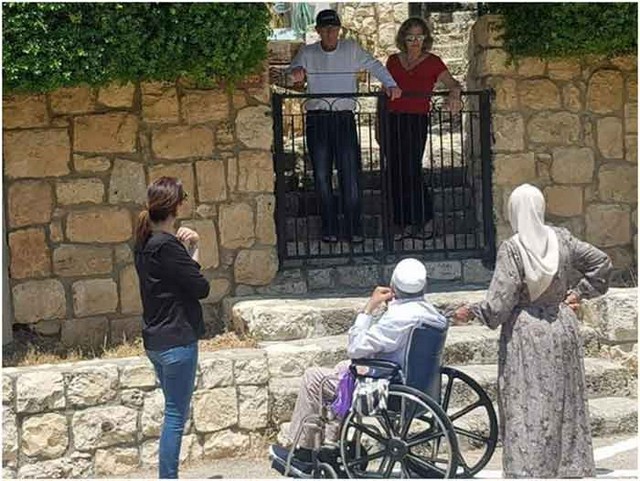By Rima Najjar
An encounter between a Jewish couple in Ijzim, Israel (south of Haifa) the the displaced Palestinians in whose house that couple resides, who are denied return to their village and property.
“On the anniversary of the Nakba … a tour through depopulated Palestinian villages within Israel … and rare meetings between the owners of the original Palestinian homes and their current Jewish residents” — Najwan Simri, reporting for Al Jazeera
Displaced Palestinians encounter Jews occupying their home in Ijzim, Israel
TRANSLATION OF THE VIDEO-CLIP NARRATION:
Information on the Palestinian village of Ijzim shown as three consecutive red text blocks throughout the video clip:
— The village of Ijzim south of Haifa is one of three villages known as the Carmel triangle of villages that fell at the hands of Zionist gangs after the establishment of Israel.
— A number of the people of the village of Ijzim took refuge in nearby cities and villages. Others took refuge in Arab countries after Ijzim’s occupation by Zionist gangs.
— Many of the landmarks of the village of Ijzim, south of Haifa, are still there as witness of the events of the Nakba 72 years ago.
NARRATION:
… Here lives a family uprooted from a nearby village. We had an appointment with Hajjeh Im Samir to accompany her there. Her [ailing] husband insisted on coming with us because he said the air of Ijzim is the best cure.
Despite its beauty, the road there seems desolate as if it gets you to the place but doesn’t take you there. Eagerly, Im Samir organizes our tour for us and tells us the names of the [Palestinian] owners of the houses.
Our first stop is God’s house. Its stones have been preserved as they were. Alone, the colors of its locked doors change each time the dryness of the seasons intensifies.
Here, Abu Samir does not stay in the car because this stop [station] is the location for which he has most longed in order to banish the other stations of his life. “This was our house, my father’s house. After the ’48 wars, the Jews occupied it.”
After a few minutes, the residents of the house come out to [the gate]. They ask us what we want. We say, this is the owner of the house; how do you feel living in a house built on the wreckage of his house? [The answer] Frankly, I don’t feel anything. I am very happy. Living here is very enjoyable.
How strange is the distance between the owner of the house and he who is occupying it. How strange is the irony between he who has to stand inside the gate and he who must stand outside the gate. How strong Abu Samir is! For other uprooted people have refused to accompany us [on our tour]. One of them told us that he cannot bear to glimpse through the window of his father’s house a foreigner living there.
And that [glimpse] could possibly be of a strange symbol, like [what is glimpsed through the window] of a stolen [Palestinian] school converted into a temple with an emblem [the flag of Israel] that is not as old as the memory of the stones of the school.
Flag of Israel glimpsed through the window of the converted school of the Palestinian village of Ijzim, which is now a Temple
And so, an extreme picture! It is said that the passage of time helps in forgetting, but, in the Palestinian case, it seems that the equation of time is different and that the years are merely a number. Rather, the longer the banishment of the Palestinians is, the more they remember.
– This is Najwan Simri, reporting from the depopulated village of Ijzim for Al Jazeera.
___________________
Rima Najjar is a Palestinian whose father’s side of the family comes from the forcibly depopulated village of Lifta on the western outskirts of Jerusalem and whose mother’s side of the family is from Ijzim, south of Haifa.
17 May 2020
Source: countercurrents.org

